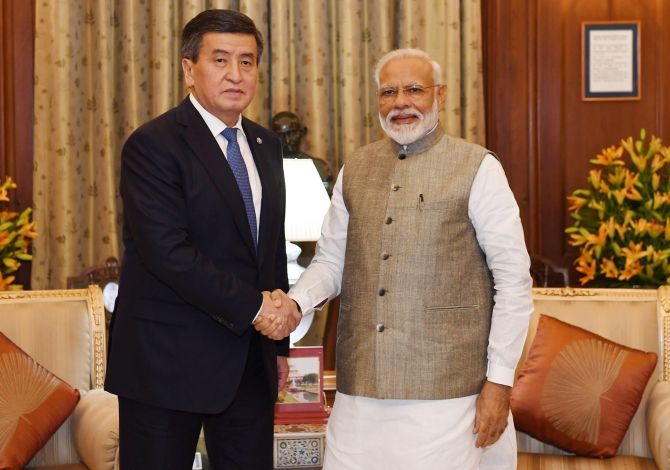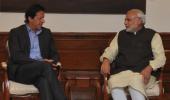The Shanghai Cooperation Organisation is very much aligned with the foreign policy priorities of the Modi 2.0 government, says Sana Hashmi.

The SCO (Shanghai Cooperation Organisation) Summit, scheduled for June 13-14 in Bishkek, Kyrgyzstan, will be the first outbound multilateral meeting for Prime Minister Narendra Modi in his second innings.
This will also be India’s second SCO summit as a full-fledged member after its induction in the 2017 Astana Summit.
It was during Modi’s previous term that participation level was elevated at the SCO. In 2007 and 2008, India was represented by Minister of Petroleum Murli Deora. It was only in 2009 that former prime minister Dr Manmohan Singh attended the summit as an observer. From 2010-14, India began to send its external affairs minister to the summit.
In 2014, India formally submitted its application for full membership of the grouping. Prior to its induction as a full member, India, along with Iran and Pakistan, was an observer in the grouping since 2005.
Modi’s decision to invite Kyrgyz President Sooronbay Jeenbekov, along with BIMSTEC leaders, for his swearing-in ceremony, signifies the importance India attaches to the SCO. Kyrgyzstan is the chair of the SCO in the current year.
Often being criticised as rather ‘inactive’, India’s ‘Connect Central Asia’ policy is finally getting the much-needed boost. India’s engagement with the countries and proactive participation in the SCO should also be seen in the context of the presence of Indian leaders and the ministers in all the SCO summits, ministerial meetings and other SCO-related meetings. The first India-Central Asia Dialogue at the foreign minister level was held in January 2019 where the former EAM Sushma Swaraj announced to set up an ‘India-Central Asia Development Group’.
India’s objectives in the SCO are wide-ranging and primarily focused on outreach efforts to the Central Asian region, strengthening counterterrorism efforts, finding avenues to expedite hard and soft connectivity, regional security, and exploring opportunities for regional energy cooperation.
SCO is very much aligned with the foreign policy priorities of the Modi 2.0 government. With the apparent sluggishness of the South Asian Association for Regional Cooperation (SAARC), India is actively looking for other regional multilateral arrangements that could act as a bridge between South Asia and the wider Eurasian region. The regional connectivity agenda such as the International North–South Transport Corridor offer crucial opportunities to India’s regional integration objectives.
The gains, however, are not unilateral; India too offers an impressive set of pluses to the SCO. In a grouping dominated by Russia and China, India’s entry makes it more polycentric. SCO has transformed over the years, which is verified by the fact that China and Russia are no longer the only decision-makers.
The SCO is brimming with potential to establish itself as a key Pan-Eurasian organisation. The characteristic of the grouping has changed significantly with the inclusion of India. India’s proactive engagement within the SCO opens up win-win opportunities for all important stakeholders.
Since the very beginning, China and other member states aspire to make the SCO an inclusive organisation with global standing. Before the inclusion of India and Pakistan, SCO was regarded as a narrowly-defined grouping. Now, the inclusion of more members transcends its geographical limitations, and has added more credibility to the grouping.
SCO is also used by Russia to balance China’s increasing political clout and economic predominance in the Central Asian region. It provides Central Asia with a platform to strengthen its multi-vector foreign policy as for them, the SCO opens up a multilateral window to engage India -- the third economy in Asia and the biggest in the Indian subcontinent.
Central Asia is one region where India and China’s interests converge rather than clash. China’s primary interest in Central Asia lies in ensuring the security of the region, for it also needs to ensure the stability of Xinjiang and protect its assets along the Belt and Road Initiative route. Being a responsible regional stakeholder, India is keen to work towards a stable neighbourhood.
SCO’s primary mandate is counter-terrorism. Considering the commonality of interests and China’s decision to finally agreeing to designate Masood Azhar as a global terrorist in the UNSC, joint counter-terrorism operations and information sharing seem an achievable goal provided the communication channels among the member States are kept constantly open. India’s active participation has the potential to strengthen the peace process in Afghanistan and eventually develop a coherent strategy towards terrorism.
A popular perception among the SCO-sceptics is that SCO, like SAARC might also get entangled in an India-Pakistan tussle. India’s participation should not be viewed through the prism of India-Pakistan relations. The binaries have already spoiled the SAARC beyond repair. The SCO, which strictly adheres to the principle of non-interference in the internal affairs of the member States, is not the platform for defusing India-Pakistan tension. Moreover, with China, Russia and Kazakhstan as the leading members, it is unlikely that the India-Pakistan issue will ever emerge as a central issue in the SCO dynamic.
The experiences of Regional Comprehensive Economic Partnership and India-ASEAN Free Trade Agreements exemplify that India does not have a good track record with the regional FTAs. It took several years for India to complete the negotiations with ASEAN. China proposed the SCO-FTA which could not find many takers.
If the SCO-FTA talks gather momentum again, India should consider getting into the negotiations, which if done carefully would bring tangible gains. The SCO Development Bank, which is also under negotiations, may facilitate India in meeting its regional connectivity goals.
A glance at the previous SCO declarations and outcome documents suggest that if not executed, such meetings and promises are only good for optics with no practical utility. It is imperative for New Delhi to push for faster implementation of the already existing objectives and work towards meeting them in a time-bound fashion.
Sana Hashmi is an analyst with the Future Directions International, a Perth-based think-tank, and author of China’s Approach of Territorial Disputes: Lessons and Prospects.










